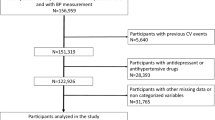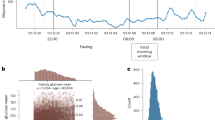Abstract
Objectives:
To evaluate total salt intake in the adult population through an analysis of sodium in 24-h urine samples in two regions of Belgium.
Methods:
Urine samples were collected over 24 h from participants and they had to complete a specific questionnaire about salt intake afterwards. Sodium and creatinine concentrations were analysed in these samples.
Subjects:
The target population comprised adults aged 45–65 years in the region of Ghent and Liege. A total of 123 and 157 volunteers from Ghent and Liege, respectively, were included in the study.
Results:
The mean creatinine level in Flanders (n=114) amounted to 0.173±0.035 mmol/kg/day, whereas in the Walloon region (n=135) it amounted to 0.161±0.036 mmol/kg/day, after the exclusion of subjects with incomplete urine collection. Intake of sodium in Flanders (n=114) was 4.29±1.29 g/day, whereas in the Walloon region (n=135) it was 3.94±1.44 g/day. In both regions, sodium intake in men was higher than in women.
Conclusion:
Salt intake was more or less twice as high as the recommended intake. Salt intake as estimated from 24-h urine collections is substantially higher than that previously calculated on the basis of food consumption data. A salt reduction programme for Belgium is primordial.
This is a preview of subscription content, access via your institution
Access options
Subscribe to this journal
Receive 12 print issues and online access
$259.00 per year
only $21.58 per issue
Buy this article
- Purchase on Springer Link
- Instant access to full article PDF
Prices may be subject to local taxes which are calculated during checkout
Similar content being viewed by others
References
Synchron LX system(s) (2004a). Chemistry Information Sheet CREm Creatinine. 389902 AB.
Synchron LX System(s) (2004b). Chemistry Information Sheet NA Sodium. 389936 AB.
Bayingana K, Demarest S, Gisle L, Hesse E, Miermans PJ, Tafforeau J et al. (2006). Gezondheidsenquête door middel van Interview, België, 2004. Afdeling Epidemiologie, WIV: Brussel.
Bingham SA, Cummings JH (1985). The use of creatinine output as a check on the completeness of 24-h urine collections. Hum Nutr Clin Nutr 39, 343–353.
Bingham SA, Cummings JH (1986). Creatinine and PABA as markers for completeness of collection of 24-h urine samples. Hum Nutr Clin Nutr 40, 473–476.
Cappuccio FP, Kalaitzidis R, Duneclift S, Eastwood JB (2000). Unravelling the links between calcium excretion, salt intake, hypertension, kidney stones and bone metabolism. J Nephrol 13, 169–177.
Cappuccio FP, MacGregor GA (1997). Dietary salt restriction: benefits for cardiovascular disease and beyond. Curr Opin Nephrol Hypertens 6, 477–482.
gezondheidsraad (2000). Keukenzout en bloeddruk. Den Haag: 2000/13.
He J, Ogden LG, Vupputuri S, Bazzano LA, Loria C, Whelton PK (1999). Dietary sodium intake and subsequent risk of cardiovascular disease in overweight adults. JAMA 282, 2027–2034.
Leiba A, Vald A, Peleg E, Shamiss A, Grossman E (2005). Does dietary recall adequately assess sodium, potassium, and calcium intake in hypertensive patients? Nutrition 21, 462–466.
Mattes RD, Donnelly D (1991). Relative contributions of dietary sodium sources. J Am Coll Nutr 10, 383–393.
Nagata C, Takatsuka N, Shimizu N, Shimizu H (2004). Sodium intake and risk of death from stroke in Japanese men and women. Stroke 35, 1543–1547.
Olafsdottir AS, Thorsdottir I, Gunnarsdottir I, Thorgeirsdottir H, Steingrimsdottir L (2006). Comparison of women's diet assessed by FFQs and 24-h recalls with and without underreporters: associations with biomarkers. Ann Nutr Metab 50, 450–460.
Reinivuo H, Valsta LM, Laatikainen T, Tuomilehto J, Pietinen P (2006). Sodium in the Finnish diet: II trends in dietary sodium intake and comparison between intake and 24-h excretion of sodium. Eur J Clin Nutr 60, 1160–1167.
Stein JH (1998). Internal medicine. Elsevier Health Sciences: St Louis, Maryland Heights, MO, USA.
Strazzullo P, D’Elia L, Kandala NB, Cappuccio FP (2009). Salt intake, stroke, and cardiovascular disease: meta-analysis of prospective studies. BMJ 339, b4567.
Vandevijvere S, Van Oyen H (2008). Sodium intake in the Belgian population. Research limitations and policy implications. Arch Public Health 66, 187–195.
Wang XQ, Terry PD, Yan H (2009). Review of salt consumption and stomach cancer risk: epidemiological and biological evidence. World J Gastroenterol 15, 2204–2213.
World Health Organisation (2007). Reducing salt intake in populations: report of a WHO forum and technical meeting 5-7 October 2006. World Health Organisation: Paris, France.
Acknowledgements
The authors acknowledge the financial support from the Federal Public Service of Health, Food Chain Safety and Environment.
Author information
Authors and Affiliations
Corresponding author
Ethics declarations
Competing interests
The authors declare no conflict of interest.
Rights and permissions
About this article
Cite this article
Vandevijvere, S., De Keyzer, W., Chapelle, JP. et al. Estimate of total salt intake in two regions of Belgium through analysis of sodium in 24-h urine samples. Eur J Clin Nutr 64, 1260–1265 (2010). https://doi.org/10.1038/ejcn.2010.148
Received:
Revised:
Accepted:
Published:
Issue Date:
DOI: https://doi.org/10.1038/ejcn.2010.148
Keywords
This article is cited by
-
Urinary sodium and iodine concentrations among Belgian adults: results from the first national Health Examination Survey
European Journal of Clinical Nutrition (2021)
-
Low-salt low-protein diet and blood pressure control in patients with advanced diabetic kidney disease and heavy proteinuria
International Urology and Nephrology (2021)
-
Current daily salt intake in Germany: biomarker-based analysis of the representative DEGS study
European Journal of Nutrition (2015)
-
Renal renin secretion as regulator of body fluid homeostasis
Pflügers Archiv - European Journal of Physiology (2013)
-
Sodium reduction and the correction of iodine intake in Belgium: Policy options
Archives of Public Health (2012)



